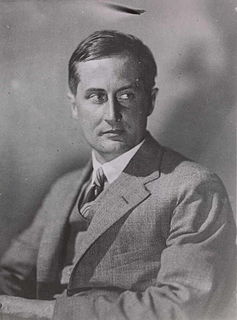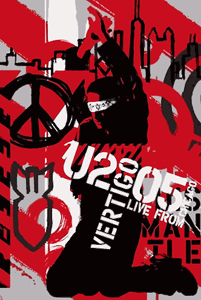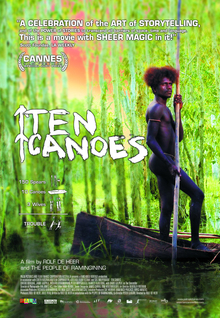Related Research Articles

David Gulpilil Ridjimiraril, known professionally as David Gulpilil and posthumously as David Dalaithngu for three days, was an Indigenous Australian actor and dancer, known for the films Walkabout, Storm Boy, Crocodile Dundee, Rabbit-Proof Fence and The Tracker.
The ATOM Awards are a group of awards offered to Australian and New Zealand "professionals, educators and students", honouring achievements in the making of film, television, multimedia, and from 2007 multi-modal productions.

Donald Finlay Fergusson Thomson, OBE was an Australian anthropologist and ornithologist who was largely responsible for turning the Caledon Bay crisis into a "decisive moment in the history of Aboriginal-European relations". He is remembered as a friend of the Yolngu people, and as a champion of understanding, by non-Indigenous Australians, of the culture and society of Indigenous Australians.

Vertigo 2005: Live from Chicago is a concert film by Irish rock band U2. It was filmed from 9–10 May 2005 at the United Center in Chicago, Illinois, during the band's Vertigo Tour. The film was released on DVD later that year on 14 November through Island Records in most parts of the world, and on 15 November through Interscope Records in the United States. The DVD was released as a one-disc standard edition and a deluxe edition with a second disc featuring bonus material and a documentary. It was the first of three concert films from the tour.

Cane Toads: An Unnatural History is a 1988 documentary film about the introduction of cane toads to Australia. Cane toads were introduced to Australia with the aim of controlling a sugar cane pest, the cane beetle, but they over-multiplied and became a serious problem in the Australian ecosystem. It is often humorous, and is used in high schools and colleges as a complement to curricula in biology, ecology, environmental science, anthropology, geography, and communication. It was filmed in Cairns and Gordonvale in Queensland.

Ten Canoes is a 2006 Australian drama film directed by Rolf de Heer and Peter Djigirr and starring Crusoe Kurddal. The title of the film arose from discussions between de Heer and David Gulpilil about a photograph of ten canoeists poling across the Arafura Swamp, taken by anthropologist Donald Thomson in 1936. It is the first ever movie entirely filmed in Australian Aboriginal languages. The film is partly in colour and partly in black and white, in docudrama style largely with a narrator explaining the story. The overall format is that of a moral tale.
The Tracker is a 2002 Australian drama film/meat pie Western directed and written by Rolf de Heer and starring David Gulpilil, Gary Sweet and Damon Gameau. It is set in 1922 in outback Australia where a colonial policeman (Sweet) uses the tracking ability of an Indigenous Australian tracker (Gulpilil) to find the alleged murderer of a white woman.
Ramingining is an Aboriginal Australian community of mainly Yolngu people in the Northern Territory, Australia, 560 kilometres (350 mi) east of Darwin. It is on the edge of the Arafura Swamp in Arnhem Land. Wulkabimirri is a tiny outstation (homeland) nearby, and Murwangi, further south, is part of the Ramingining Homelands. Marwuyu Gulparil, also known as Gulparil Marwuyu or just Marwuyu, is another remote community to the south of Ramingining.
Reginald Cribb is an Australian playwright and actor.

David Selvarajah Vadiveloo is an Australian lawyer, human rights and education consultant, cultural broker and screen producer.

Tracey Moffatt is an Indigenous Australian artist who primarily uses photography and video.

Dr. Andrew Pike, OAM is an Australian film historian, film distributor and exhibitor, and documentary producer and director. Pike formed Ronin Films, an Australian film distribution company, with his first wife, Dr Merrilyn Fitzpatrick, in 1974. With Ross Cooper, he co-authored the book, Reference Guide to Australian Films 1906–1969 and has produced and directed many documentaries since 1982. Pike has been honoured with numerous awards including a plaque on the ACT Honour Walk in Canberra City, appointed of the Order of Australia (OAM) and an Honorary Doctorate from the University of Canberra.

Charlie's Country is a 2013 Australian drama film directed by Rolf de Heer. It was selected to compete in the Un Certain Regard section at the 2014 Cannes Film Festival where David Gulpilil won the award for Best Actor. It was also screened in the Contemporary World Cinema section at the 2014 Toronto International Film Festival and awarded the Best Fiction Prize and the Youth Jury Prize at the 2015 International Film Festival and Forum on Human Rights (FIFDH) in Geneva.
For Love or Money - a pictorial history of women and work by filmmaker-authors Megan McMurchy, Margot Oliver and Jeni Thornley is a companion book to the film of the same name released in 1983. This project arose out of the 1977 Women’s Film Production Workshop and the 1978 inaugural Women and Labour Conference. It involved interviews with many women and research into hundreds of feature films, documentaries, home movies, commercials and news reels and effectively revealed the working lives of Australian women. Feminist and union activist, Edna Ryan, who had been instrumental in achieving equal pay for women, also made editorial contributions to both the film and book. The film has recently been digitised and has been screened at the 2017 Sydney Film Festival when it was hailed as "a major work of historical research, a masterclass of montage editing and a classic essay film."
Ivan Gaal is an Australian filmmaker. He primarily makes documentary films. He has also worked as a professional photographer, and also gained recognition as a canoeist.

David MacDougall is an American-Australian visual anthropologist, academic, and documentary filmmaker, who is known for his ethnographic film work in Africa, Australia, Europe and India. For much of his career he co-produced and co-directed films with his wife, fellow filmmaker Judith MacDougall. In 1972, his first film, To Live with Herds was awarded the Grand Prix "Venezia Genti" at the Venice Film Festival. He has lived in Australia since 1975, and is currently a professor in the Research School of Humanities & the Arts at Australian National University.

Judith MacDougall is an American visual anthropologist and documentary filmmaker, who has made over 20 ethnographic films in Africa, Australia and India. For many of the films, she worked with her husband, David MacDougall, also an anthropologist and a documentary filmmaker. Both of them are considered among the most significant anthropological filmmakers in the English-speaking world.

Another Country is a 2015 documentary film about the intersection of traditional Australian Aboriginal culture and modern Australian culture. It features actor David Gulpilil narrating a story about his home community of Ramininging in the Northern Territory.
My Name is Gulpilil is a 2021 documentary film about the life of celebrated Australian actor David Gulpilil, at the time sick with stage four lung cancer. Directed by Molly Reynolds, the film covers his acting career, his life in Murray Bridge, the cancer, alcohol addiction, and his various marriages and relationships.
References
- ↑ Reynolds, Molly (3 March 2016), Another Country (Documentary), Vertigo Productions, Bula'bula Arts Aboriginal, retrieved 29 November 2021
- ↑ Bassi, Shekhar; Reynolds, Molly (21 October 2020), ShoPaapaa (Drama), Adelaide Film Festival, Intelligent Ink Films, Vertigo Productions, retrieved 30 November 2021
- ↑ Paine, Will (20 May 2021). "Molly Reynolds: My Name Is Gulpilil". FilmInk. Retrieved 30 November 2021.
- ↑ Internet, Chirp. "Molly Reynolds - Ronin Films - Educational DVD Sales". www.roninfilms.com.au. Retrieved 30 November 2021.
- ↑ Internet, Chirp. "BALANDA AND THE BARK CANOES, THE - Ronin Films - Educational DVD Sales". www.roninfilms.com.au. Retrieved 30 November 2021.
- ↑ Internet, Chirp. "STILL OUR COUNTRY - Ronin Films - Educational DVD Sales". www.roninfilms.com.au. Retrieved 30 November 2021.
- ↑ The Waiting Room (2018) , retrieved 30 November 2021